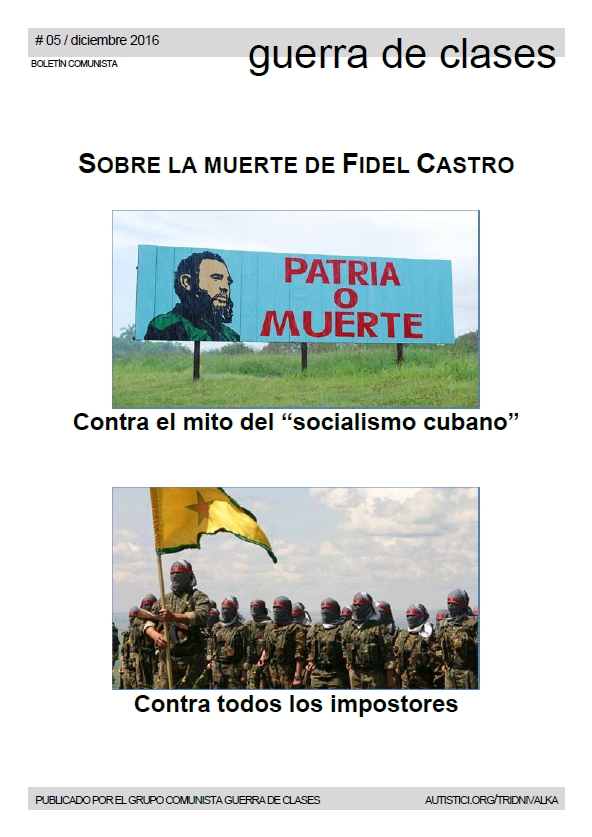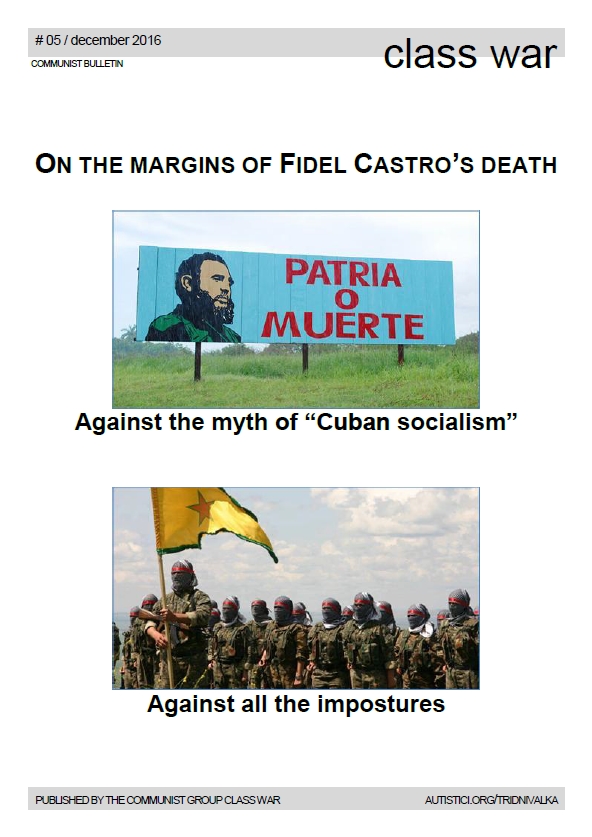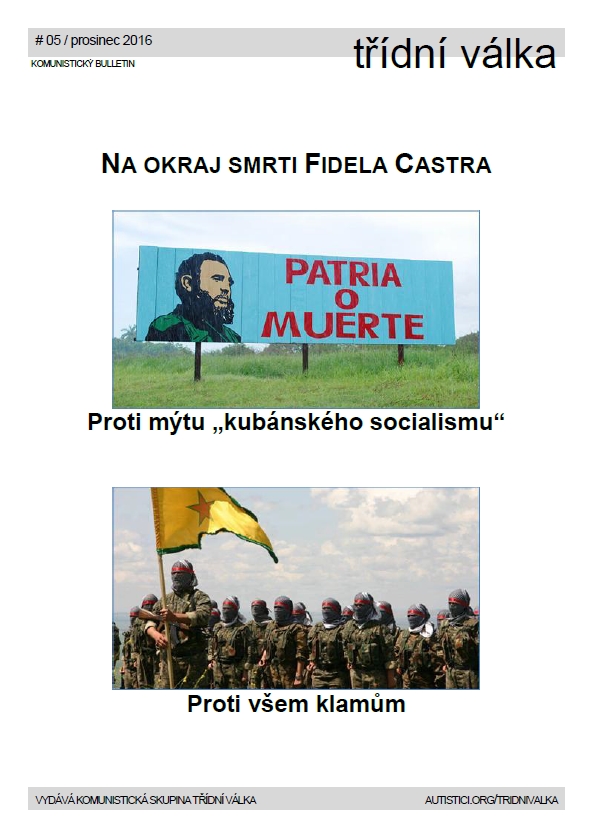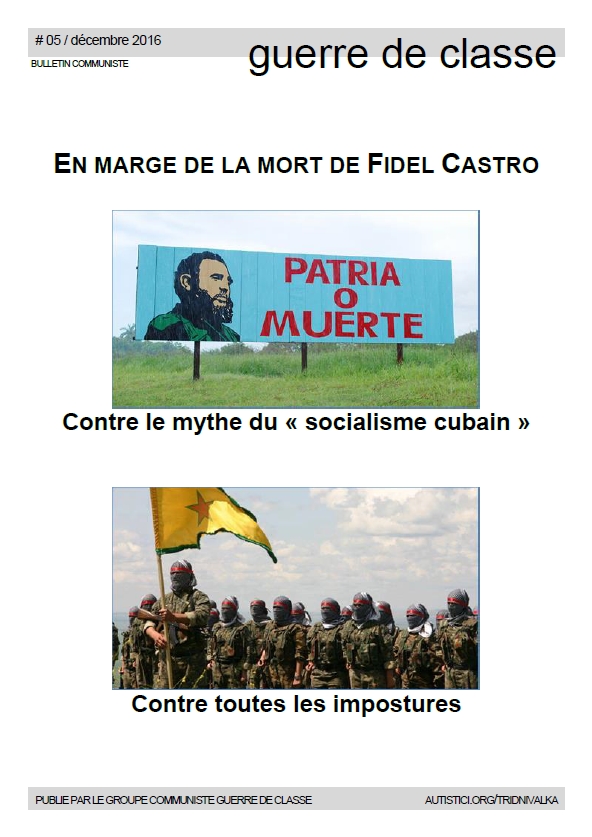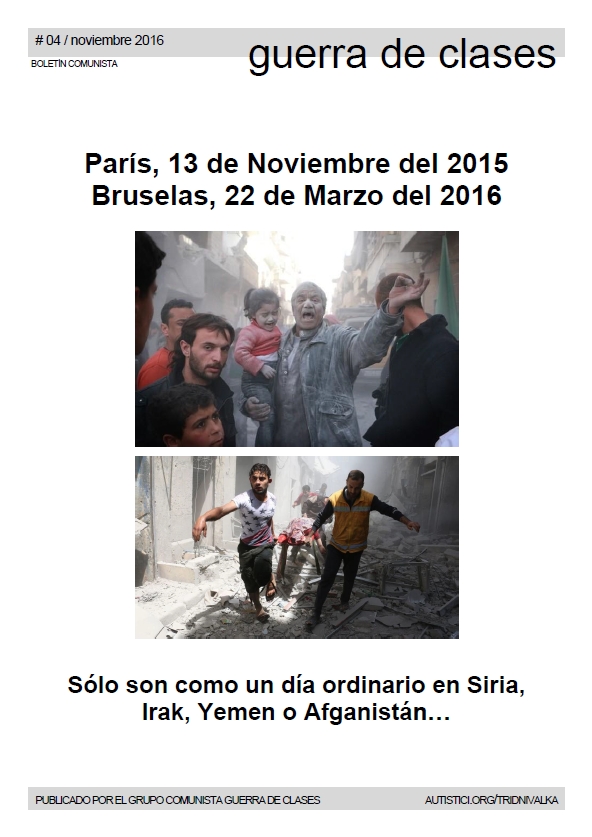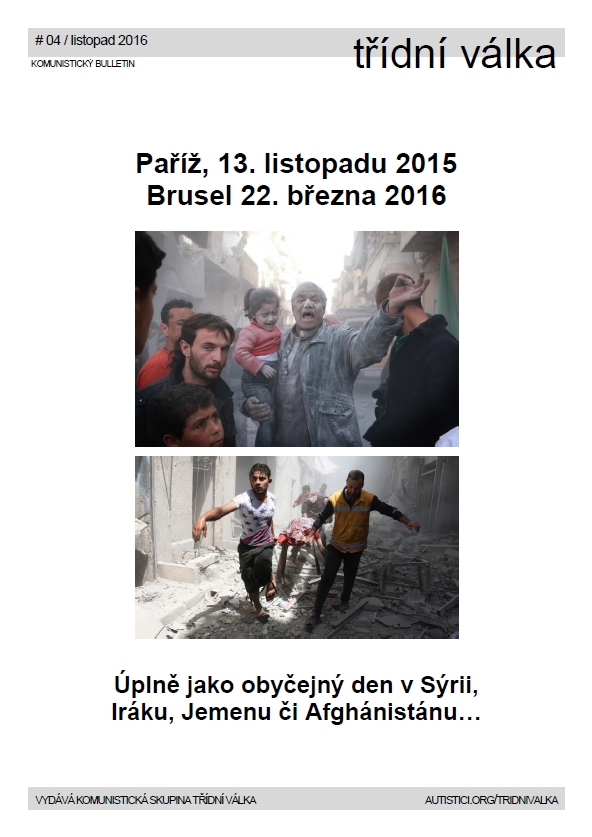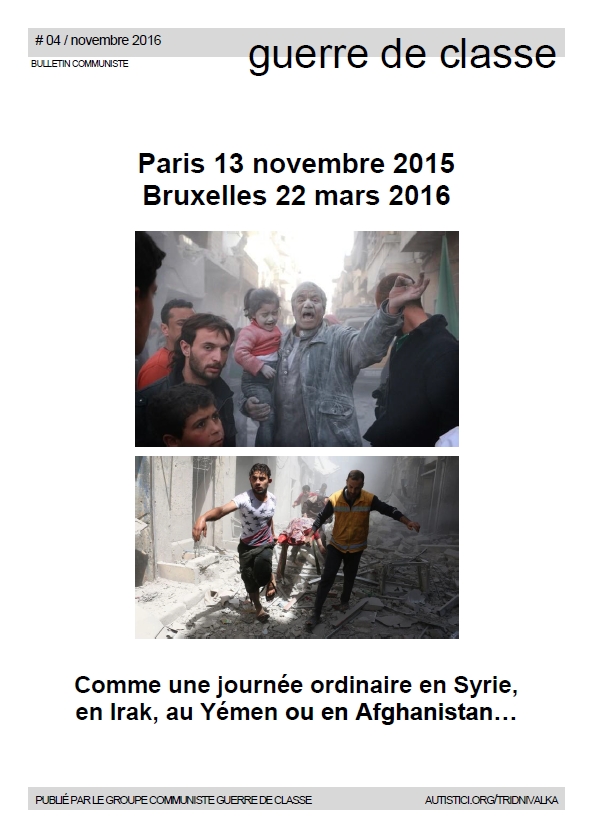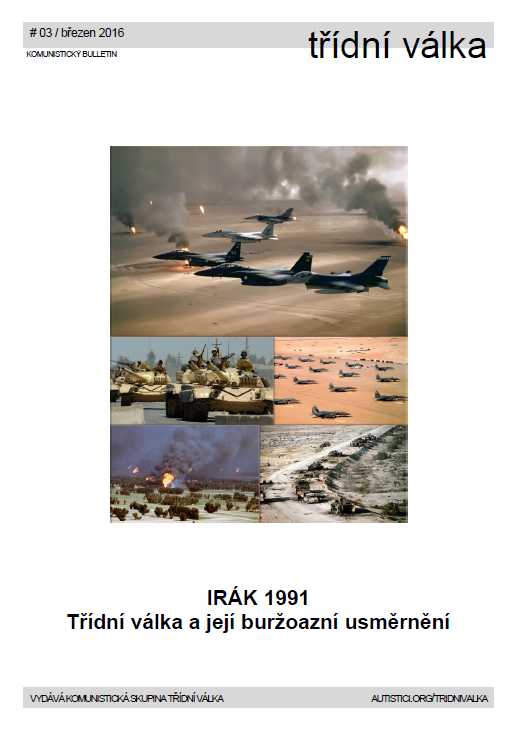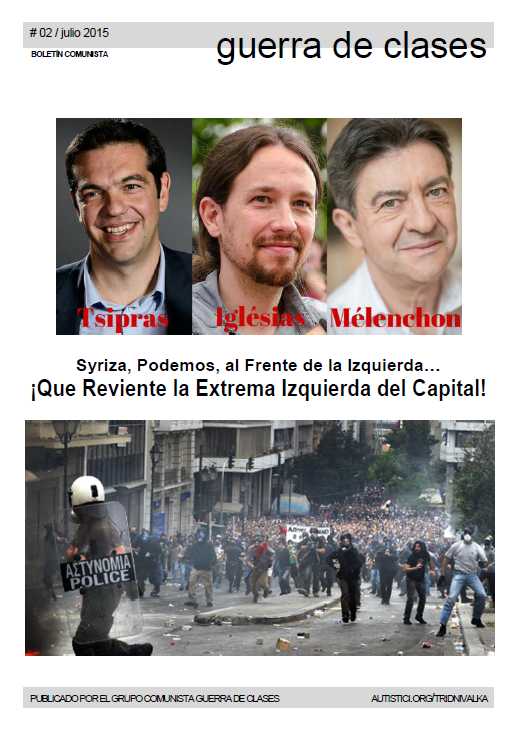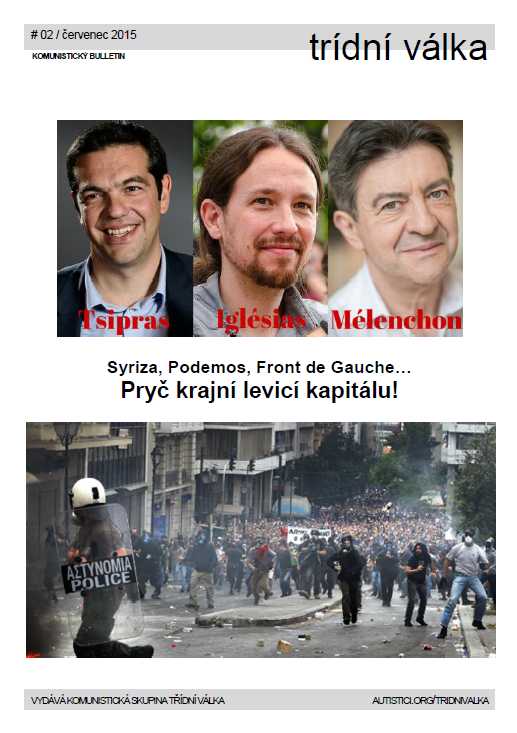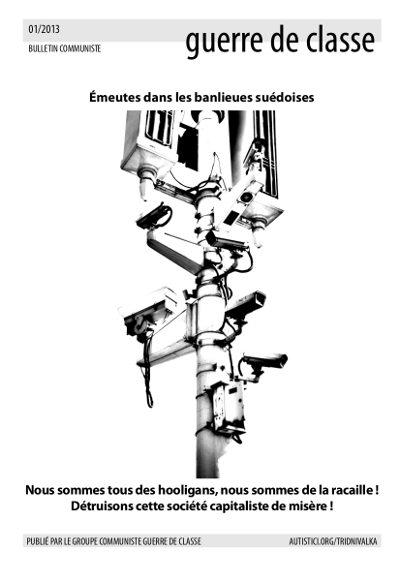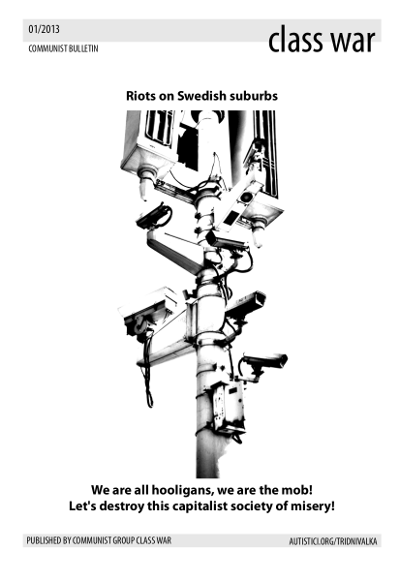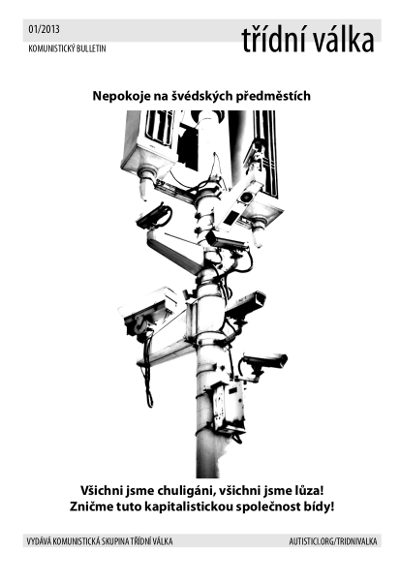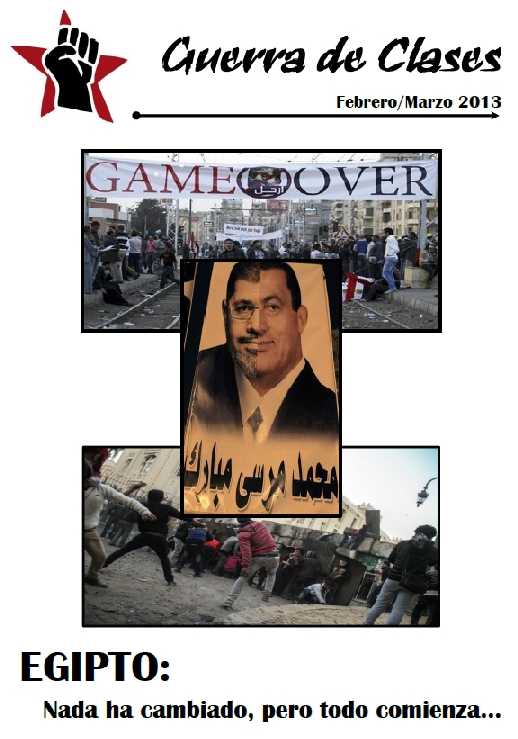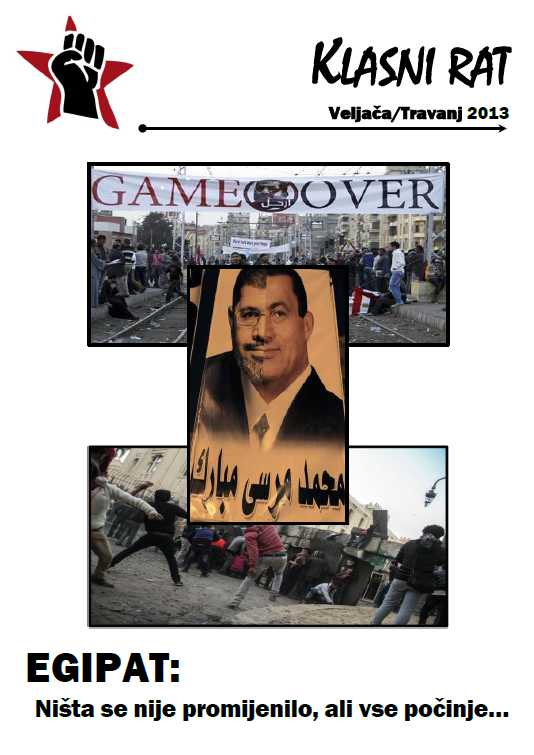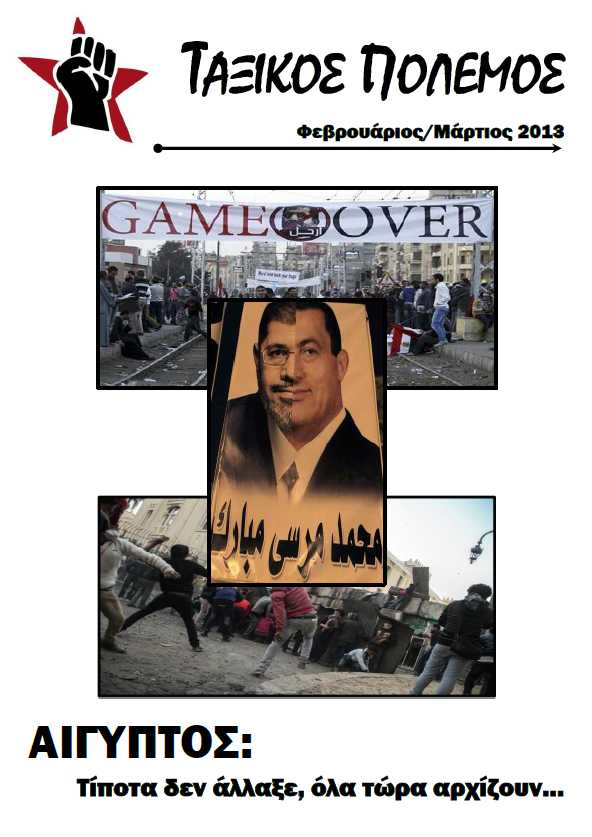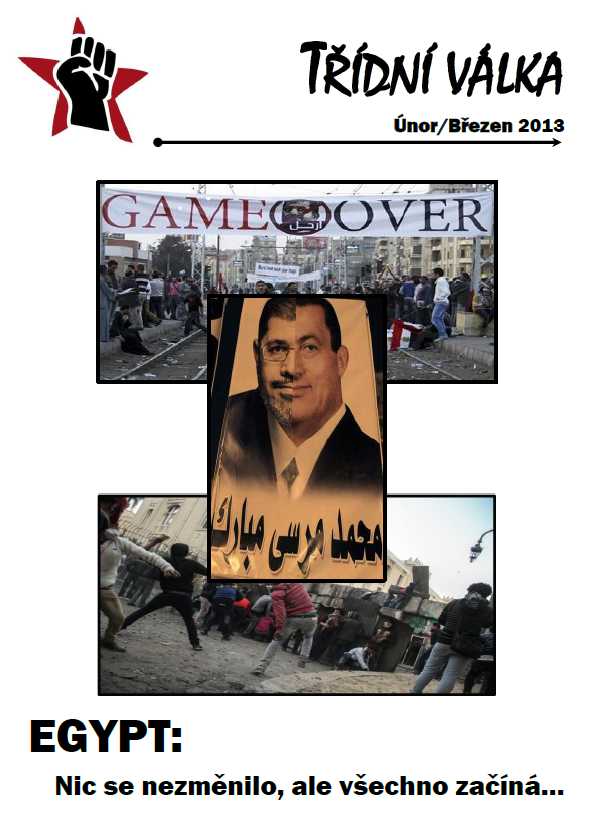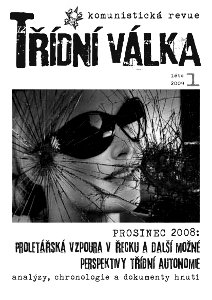Notes:
(2) Mutual competition of individual capitals produced a protracted crisis, which could not have been successfully solved for a long time. Existing markets were saturated and it was necessary to conquer new ones and, primarily, value of products and means of production was decreasing. War was the only way out of the crisis – a mass liquidation of surplus constant and variable capitals. It through reconstruction that general destruction (devalorization) renders a new beginning of the valorisation cycle possible.
(3) Dál nad námi vlá rudá vlajka čistá, Prague 1952, p. 135.
(4) We are aware of the fact that “Czech proletarians” and other expressions of this kind are not a particularly good way of expressing class reality, but as on many other occasions we are here prisoners of bourgeois language. And it happens exactly in the moment when we are trying to attack nationalist ideology and national myths surrounding the Austro-Hungarian dusk and the Czechoslovakian bourgeois state’s birth. We want to show to readers that rebellion was not a privilege of “the Czechs”, but of proletariat on both sides of the national divide. That is why we ask readers for sympathy and clemency every time they come across such bourgeois-like expressions in our text.
(5) And they were dying in a large scale… or at least a part of them. Only during the first two war years 450.000 ordinary Austro-Hungarian soldiers of urban and countryside proletarian origin died, while there were mere 50 dead soldiers from the ranks of factory owners and landowners.
(6) The central printed organ of the CSSDWP.
(7) As the Austrian Social Democracy Šmeral was a partisan of so called Austro-Marxism, which means that he recognised and actively advocated a bourgeois right of nations for self-determination. This was in marxist ideological optics accompanying bourgeois revolution, which was in his mechanistic conception of history the only revolution being on the agenda in the Habsburg monarchy. Since for him the neccessary outcome of history was a subsequent transformation (of course, carried out by Social Democracy) of national bourgeois states into an international federation of (national) socialist republics, he prefered reforming Austro-Hungary into a federation of national units to its destruction into small independent national states. Thanks to the fact, that as the only one of more important party figures, he was consistently standing behind a leftist slogan of a “socialist republic”, he became a leader of left currents in the CSSDWP already during the war. However this can not change in any way the fact, that through his practical policy he vehemently assisted the national liberationist counter-revolution in subjecting a proletarian movement (as we will show further in the text). Already in 1917 the right-wing and much more nationalist faction of the party removed from his position of the chairman. After establishment of the Czechoslovakian Republic anti-Austrian nationalists were accusing him from a non-patriotic attitude, so the CSSDWP banned him from a public life and put him away to Switzerland.
(8) “Czech Communists-Anarchists – at least a vast majority of them – lead by a profound consideration and a healthy instinct took immediately at the beginning of the war a resolute stand against the biggest and closest danger, against German and Austrian imperialisms. Today, when we have already had news and documents from abroad, we can see, that also elsewhere the best comrades of ours placed themselves on the anti-German side. (…) Of course we have the same standpoint also towards non-German imperialism. But it will not be ever neccessary to fight against Western imperialism through a war; this will be slowly dismantled by victorious Socialism. We can not believe that Anglo-Saxon soldiers woueld ever be willing to march against continental socialist Europe.” “The Congress of Czech Anarchists-Communists”, Červen, II., 1919, No. 1, pp. 6-9; No. 2, pp. 14-15.
(9) He was a brother of Viktor Adler, the leader of the Austrian social democratic party.
(10) Also here we have to draw the reader‘s attention to the weight, with which bourgeois ideology was laying in minds of the then class fighters. Karel Verner uses formulations such as “Austrian subjection”, although proletariat finds itself in a capitalist subjection and it does not really matter, if it is managed by an Austrian or Czech state apparatus.
(11) He means October 1917 and the infuence of the armed insurrection in Russia.
(12) Antonín Klimek in his book Říjen 1918 – vznik Československa (Paseka, Prague and Litomyšl 1998) quotes the period bourgeois press: “On September 29 “farmer, Jan Machek from Doubravice at Bílá Třemošná was murdered on a public road near his farm. Perpetrators… cut his neck artery with a sharp knife” and stole his money. “The crime was committed by 5 to 6 men in military uniforms armed with repeater rifles. Farmer Josef Hrdinka was robbed by them of 2 big duvets and 84 kg of rye flour equal to 2.700 crowns, all of which they stole from his pantry… Murder culprits were pursued” and while running away they fired 25 rifle shots. They disappeared and “so far the search has been fruitless.”
(13) According to Jakub Sedlařík’s recounting a gendarmery unit commanded by constable Kolomazník tried to catch a “Green Cadre” and a revolutionary agitator, František Krška, in Chvalnov. Instead of him, however, gendarmes arrested by chance another “Green Cadre”, Antonín Herodek. The news of Herodek’s arrest quickly spread and other armed deserters stopped gendarmes, when they wanted to escort their arestee out of the village. Insulted a lot by a covey of local people gendarmes withdrew back to the village, into Herodek’s house, but refused to release the “Green Cadre”. “About 15 men arranged Herodek’s liberation. They got into the house through the yard, broke into the kitchen and attacked the gendarmes. Kolomazník ordered to shoot, but carrying out of this order was violenty rendered impossible by the raiders. Badly beaten gendarmes just asked the people not to take their weapons, because they would be punished by loosing their jobs. The action was successfull, Herodek escaped, raiders dispersed. And than we saw tired gendarmes in torn up uniforms how they run away through the village backyards towards Střílky.”
(14) But gendarmes were intentionally liquidated even in the Czech Lands. On October 25 1918 gendarmery raided Bystrc woods near Brno city in order to arrest deserters. They arrested a 22 years old deserter Střecha and three his comrades suspected of murdering a 30 years old gendarmery constable Macourek, notorious for “his eager persecution of deserters”. The constable was found on October 15 in the river near the village of Komín with 20 serious wounds on his body and no boots.
(15) It was probably an ad hoc grouping of radically spirited sailors meeting each other in harbour pubs.
(16) But the Russian Revolution really had an effect on countless other captives, as is for example testified by recollections of one of Rumburk mutineers, Josef Veselý: “As a prisoner of war I was then employed in agricultural works in the Kherson region, when the October Revolution began to penetrate there with all its consequences. My brother was in the “Tatranian” 7th Rifle Regiment of the Czechoslovakian Legions. At the time he was in Kharkov, we were exchanging letters, but I had different views than him, who was preparing for being shiped to the French front. I believed, that it was necessary to start off a resistance directly at home and to finish the war according to the Russian example…” With this aim Veselý and several hundreds of other prisoners of war set on a journey from Zhitomir to home in January 1918. They wanted to sneak through the Russian-Austrian lines and to make a revolution in the Czech Lands. But those, who were not shot dead by the remnants of the Russian army, were again captured by the Austrian army.
(17) An 18 years old shoemaker from Nový Volinsdorf near Podbořany.
(18) For example, for a participation in the mutiny and disrupting public order three young „German“ female proletarians were arrested: Maria Kögler, Ida Eiselt and Maria Hille. According to a gendarmery report they urged workers, “standing in the streets to join the mutineers and ridiculed and insulted soldiers, who wanted to stay neutral, in order to incite them to join the revolting subjects.” According to another gendarmery report a boy called Umlauf joined the mutineers in Krásná Lípa. Soldiers gave him a bayonet, pistol and cartridges and he marched with them up to Česká Kamenice. When the mutiny was crushed „German“ female workers and soldiers decorated graves of executed mutineers with flowers.
(19) As for example tried (though insufficiently) Makhnovist insurgents in the Ukraine.
(20) In the morning on the same day as Rumburk soldiers the Czech soldiers in Nov ý Bor also disobeyed their officers because of hunger. However, commandant Flibor persuaded them with promises and hidden threats and subsequently used them in the combat against mutineers. Soldiers of the 18th Infantry Regiment from Česká Lípa also let themselves to be used in the counter-mutiny opperation, even though on May 10 1918 they also made a little hunger mutiny. This was put down at the very beginning and 48 soldiers were charged with it. But because unlike Rumburk soldiers they did not strive to provoke a social revolution, 39 charged soldiers were freed and a postponement of prison sentences was allowed for the other nine men. This isolation of individual struggles and a failure of other struggling proletarians to actively identify with them also points at weaknesses of the then class movement and indicate illusoriness of Noha’s conception, that a mere example is enough to provoke a revolution.
(21) Several days after he would be executed for this statement together with other mutineers.
(22) It is not completely uninteresting, that on the same day, when the Rumburk soldiers arrived at Terezín, lance corporal Fischer found a leaflet written in German in a dormitory of the Terezín 42nd Infantry Regiment. It said: „Dear companions, our oppressors are getting worse and worse. Now they have us shot and prepare cannons. Everybody knows his dogs. Do not forget about Kastell and sergeant major Weber, who is tearing our guts alive. Do not be affraid of the Czechs, they will join us.” But none of German soldiers plucked up courage for another mutiny. Instead of it another Rumburk soldiers found their death in Terezín, because they were kept in horrible conditions and died of diseases and malnutrition. Today we know names of only 11 of them: Jan Jícha, František (Ondřej) Barnd, František Kunz, Josef Maša, Karel Tuchek, František Veverka, Rudolf Macho, Rudolf Belčický, Josef Prášek, J. Šmidek and Karel Werner.
(23) Flibor would later become an agile officer of the Czechoslovakian army and he would get to the rank of colonel in 1929. His participation in crushing the Rumburk mutiny would never be a particular trouble for him, since on one hand the new state tried to publicly present the mutiny as a nationalist one, but on the other the ruling bourgeois factions perfectly knew, that this was not the case and that by its own nature the mutiny was a subversive class act. This could not be changed even by the fact, that following their liberation from Terezín about 300 Rumburk soldiers fell for the general national elation and enlisted in the Czechoslovakian army and in 1919 they even fought against the Hungarian Red Army in Slovakia. For their new Czech superiors they were automatically beared a stain of being bad soldiers and rebels. The Legion’s general, Eduard Kadlec, commented Rumburk soldiers in 1920: “Persons of this kind must be swept out from the army…” Survivors of the mutiny established the Rumburk Mutineers Association in 1928. Although its members had not had anything in common with class struggle for a long time, state authorities considered them as “Reds” or even “Communists” anyway and made a lot of problems to them.
(24) But in the moment, when the national state of the Czech bourgeoisie would come into existence, the same Tusar would persuade Czech soldiers to stay in Austria in order not to make an already difficult situation at home even more complicated, because it was pregnant with class contradictions: “Stay on your places for the moment. There is not enough food for you at home. Trust completely the Czechoslovakian government’s deputy, who will lead you out from here as soon as possible.”
(25) It is the changeover of October 28 1918, which led to the proclamation of the independent Czechoslovakian state.
(26) They were employed in Austria because of militarization of labour and all-imperial mobilization of labour forces.
(27) Sokol (Falcon) has been a very traditional bourgeois nationalist sport organisation.
(28) The Entente bourgeois press of the time called Masaryk “the Master of Siberia”.
(29) Slavishly grateful Czecho-Slovakian bourgeoisie would rename the city of Prešpurk according the US president. Before the city would have gained its present name Bratislava, it would be called for a while Wilsonovo.
(30) Several leading Czech figures (among them Karel Kramář and Alois Rašín), who were members of the Maffie, were arrested for their activities and sentenced for a high-treason, but the new emperor Karl I (unhappily) granted them pardon in 1916 (it would not last long and young proletarian militants will try to violently eliminate these enemies of our class – for them there would not be any possibility of reconciliation as for the last Habsburg emperor and the Czech bourgeoisie).
(31) Soon even the previously mentioned “Centralists” would join the Socialist Council.
(32) Which question should in fact have been of absolutely no importance for the workers, since they did not have a slightest possibility to send their children to be indoctrinated there by bourgeoisie.
(33) Its main protagonists in the October general strike were social democratic leaders Šmeral, Stivín, Bechyně and even more nationalisticly spirited national socialists Stříbrný, Franke and “anarchist” Luisa Landová-Štychová.
(34) The paper Český socialista (the Czech Socialist), October 11 1918.
(35) When the bourgeois Right-wing of the National Committee learnt about this plan, they immediately disassociated themselves from proclaiming the republic, because it was affraid of violence, a lost of control over an establishment of its own state and gratuitousness of this act, which was not co-ordinated with the resistance in abroad and the Entente.
(36) Authorship of this Circular and the idea of proclaiming the republic were subsequently ascribed to Šmeral, although the Circular featured names of all Action Committee members. It was an obvious attempt of other “socialist” leaders to look better in their Right-wing allies’ eyes and to blame Šmeral’s extreme Left for the radical rhetoric.
(37) In the same time the leader of the German Social Democracy in the Czech Lands, Seliger, announced his willingness to negotiate with right-wing German nationalists a creation of the National Council of German Bohemia, which was to be similar to the Czech national liberationist National Committee.
(38) There were more cases like this one. For example a right-wing social democrat, Modr áček, made an ironical comment on his co-partisan, Pařízek, that on October 14 in Brandýsko region he was at the head of “´the socialist revolution´, which was finished, when gendarmes intervened and people went home.”
(39) A recollection of a Kladno militant, Karel Verner, from a book 1921 – Vzpomínky na vznik KSČ , Nakladatelství politické literatury, Prague 1962.
(40) We mean all materializations of historical Social Democracy at the time – ie. not only the CSSDWP, but also National Socialists and their “anarchist” wing.
(41) For example: in the Engert mine. See Antonín Zápotocký, Rudá záře nad Kladnem, Práce – Vydavatelstvo ROH, Prague 1951.
(42) Bourgeoisie and its media called everything, what smelled at least a little bit by questioning domination of Capital in its existing form, as Bolshevik. This is why this label was used for/by everybody, from radical social democrats to real classist militants, who were a practical expression of the real communist movement of proletariat.
(43) On October 27 the emperor Karl assigned the Austro-Hungarian minister of foreign affairs, Gyula Andrassy, to ask the Entente for an armistice. So called Andrassy’s Note went to the world. The monarchy’s government just expressed its agreement with peace conditions of the US president Wilson in it. Impatient proletarians as well as bourgeoisie in the Czech Lands understood this note as a proclamation of surrender. This happened only on November 3 1918.
(44) For example a shopkeeper František Kopecký wanted to incite a crowd to lynch his Jewish competitors. Even a well known anti-Semite and stupid nationalist and anti-communist songs‘ writer, Karel Hašler, got into an awkward situation. A crowed wanted to beat him, considering him to be… a Jew (!), so he had to desperately shout, “Folks, do not beat me, I am not a Jew, I am Karel Hašler.”
(45) As the Prague command reported to Vienna, “authoritative figures believe this will lead to an immediate increase in productivity of labour.” Do not forget, that labour discipline was on a low level in that time and sometimes its decrease transformed into an anti-work resistance.
(46) In neighbouring Germany a Social Democratic counter-revolution also strived to redirect a revolutionary upheaval inside proletarian masses towards a struggle against the empire and for the Republic. Confronted with a much stronger class struggle it however made a much more profound reform of the state shielded by the watchword of “Democracy” (the old empires were democratic in their contents even earlier, though imperfectly, because they hid class antagonism by making from people citizens of a state). It integrated even workers councils and militias into the renewed state structure. Despite the fact, that in 1930s the Czech bourgeoisie would pose as a guardian of “democratic traditions” in Central Europe, during the first years of the Czechoslovakian Republic a part of the German bourgeoisie from Sudeten – especially local German social democracy – based its opposition against the Czechoslovakian state not only on the right of nations for self-determination, but also on the fact, that the Czechoslovakian Republic was not a truly “democratic state”, according to their own words.
(47) Which would become a tradition of all Czech bourgeois changeovers and Stalinist February 1948 is no different from it.
(48) In order to strengthen the central power, to make it more effective and to eliminate chaos from the administration, on December 4 1918 Kram ář´s government disbanded local National Committees and forbade their further functioning.
(49) In an apparent effort to refer to the Taborites faction’s communist tendencies in the times of the so called “Husite Revolution”, which can be seen as the first modern attempt at social revolution on the European continent, in the course of which two antagonistic camps began to profile: proletariat (the poor, serfs and wage labourers) and bourgeoisie (the Third Estate).
(50) The Czech National Socialist, V. Klofáč, declared already on October 20 1918 at a public gathering: “The Entente will not allow the border areas to be snatched from the Czechs. Anyway even local German factory owners have already notified the National Committee, that they want to stay in the Czech state.”
(51) The Austrian bourgeoisie itself and its political representatives were willing to give up anything in exchange for food stuffs, with which they could feed and pacify its own working class. A. Rašín commented on the situation in Vienna in the following way: “They would exchange anything for potatoes: even the Czech state, even Deutschböhmen. (…) Everything is revolving around potatoes and flour. They are affraid of revolution in Vienna.”
(52) Here a clear parallel offers itself, a parallel between T. G. Masaryk, who is depicted by the dominant form of bourgeois ideology as a humanist, and another humanist, let us say Masaryk of our days, Václav Havel and his defence of current wars. Both prove, that bourgeois humanism with its preaching of all-human values, rights and morality is a counter-revolutionary ideology, which in fact advocates an uncontrolable, inhuman, alienated and alienating dictatorship of value valorizing itself, exploitation of proletarians and wars, in which proletarians are slaughtered.
(53) Polish nationalists did not want only a re-incorporation of the annexed areas of Těšínsko into Poland. The most radical of them demanded the whole region of Těšínsko up to the Ostravice river, which demand was expressed by a slogan, “The Ostravice is the Polish border.”
(54) Originally the German Workers Party, an analogy of the Czech National Socialists.
(55) Which is the reason, why even the Smeralian “faction” can not be compared to, for instance, Spartacists, Bolsheviks or Left Esers. It worked neither like an independent organisation nor like an organised group inside the party and did not engage in the high-tide of class struggle in the years of 1917 and 1918.
TŘÍDNÍ VÁLKA # CLASS WAR # GUERRE DE CLASSE
Kdo chce mír, musí se připravovat na revoluci. Kdo chce revoluci, musí se připravovat na třídní válku.
This entry was posted in Activity of the group - English, English, Revolutionary Wave 1917-21. Bookmark the permalink.
